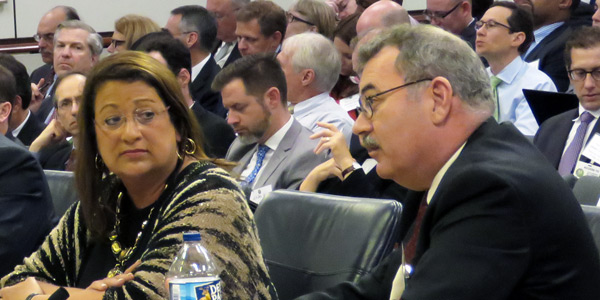By Rich Heidorn Jr.
WASHINGTON — The minimum offer price rule came up frequently at last week’s FERC technical conference exploring tensions between state clean energy policies and RTO/ISO markets in the East, with some witnesses calling for its expansion and others seeking its relaxation or abolition.
Robert Erwin, general counsel of the Maryland Public Service Commission, called on FERC to help states achieve their energy policy goals by simplifying the “unduly complex” capacity market rules and reducing “the chilling effects” of the MOPR on state innovation.
He was one of several MOPR critics who invoked the words of former FERC Chairman Norman Bay to buttress their case. (See Bay Blasts MOPR on Way Out the Door.)
MOPR ‘Cudgel’
“State policy decisions over new generation — previously exempted under the [PJM Reliability Pricing Model] settlement — have become subject to the cudgel of the minimum offer price rule,” Erwin complained. “We believe that the putative threat of state initiatives that the MOPR was devised to counter is overblown. Accordingly, the Maryland commission agrees with former Chairman Bay that the MOPR, as currently utilized, ‘places [FERC] in constant tension with the states’ and inhibits valuable state policies.”
The Sierra Club also quoted Bay’s comments in calling for “curtail[ing]” the use of the MOPR, citing his criticism that “‘MOPR not only frustrates state policy initiatives, but also likely requires load to pay twice — once through the cost of enacting the state policy itself and then through the capacity market.’”
“We agree that it is essential to mitigate actual buyer-side market power, but encourage the commission to undertake a more careful examination of the evidence as to whether buyer-side market power is exercised in capacity or energy markets and develop appropriate screens to be applied whenever a mitigation mechanism is premised upon the existence of such power,” said Mark Kresowik, deputy director of the eastern region of the Sierra Club’s Beyond Coal Campaign. “As former Chairman Bay observed, ‘the commission simply assumes [buyer-side market power] exists. The commission has not explored or tested these assumptions in its orders, and it does not know whether they are true.’”
ISO-NE Proposal Would Limit MOPR
FERC currently allows ISO-NE to exempt 200 MW of renewable generation from the MOPR annually. (See ISO-NE Two-Tier Auction Proposal Gets FERC Airing.)
Angela M. O’Connor, chairman of the Massachusetts Department of Public Utilities, said that in addition to the short- and long-term policies being discussed by stakeholders in the New England Power Pool’s Integrating Markets and Public Policy (IMAPP) initiative, “we hope to explore other potential solutions, including a further examination of the minimum offer price rule, which presents a significant challenge to the participation of state-supported resources in the Forward Capacity Market.”
“Any IMAPP proposal that substantially increases the amount of clean energy resources entering the FCM will likely involve either the elimination of or modification of the minimum offer price rule,” said New Hampshire Public Utilities Commissioner Robert Scott, who added that his state has not taken a position on any potential changes to the rule. “Such a change in market design should be accomplished in a thoughtful manner and certainly not without a full understanding of the likely long-term implications for electric rates.”
Harvard University’s William Hogan also quoted Bay in urging FERC to minimize the role of the capacity markets.
“In his last comments about the minimum offer price rule, Commissioner Bay summarized: ‘The premise of the MOPR appears to be based on an idealized vision of markets free from the influence of public policies. But such a world does not exist, and it is impossible to mitigate our way to its creation. The fact of the matter is that all energy resources receive federal subsidies, and some resources have received subsidies for decades.’
“The factual premise is well founded. They are myriad subsidies, many beyond the commission’s jurisdiction,” Hogan continued. “It is also true that the commission cannot, by itself, unwind all these subsidies to create the idealized vision of pure markets.”
While the capacity markets exist, however, Hogan said FERC should “strengthen anti-manipulation efforts such as the MOPR.”
“The avowed purpose of capacity markets is to correct for defects in energy pricing. If this is the case, the commission should have no obligation to accommodate subsidized resources that, in effect, make the problem worse. The commission can and should limit access and discriminate against those subsidized resources that are adding to the problem of inadequate pricing in energy markets.”
PJM, Monitor Disagree

PJM Independent Market Monitor Joe Bowring and Dynegy CEO Robert Flexon both told FERC it should expand the rule to include existing generation as well as new resources. PJM officials also have called for such an expansion. (See PJM: MOPR Could be Improved, but not by BRA.)
Flexon said FERC should require “adequate minimum bids for all existing and new resources that receive revenue or revenue certainty (e.g. long-term multiyear contracts, ZEC payments) from sources other than the competitive marketplace. All resources, new and existing, should be required to bid at least the level they would have bid if they were being supported solely by the competitive market.”
“The MOPR should be expanded to address subsidies for all existing and proposed units, and this should be done expeditiously,” Bowring said. “An inclusive MOPR is the best means to defend the PJM markets from the threat posed by subsidies intended to forestall retirement of financially distressed assets. The role of subsidies to renewables should also be clearly defined and incorporated in this rule.”









